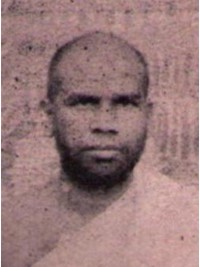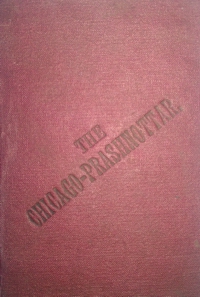74. Question:
What should man do for God?
Answer:
God does not want anything, but devoted men should in order to wipe off their evil actions, worship God by installing his image of the form such as He had when He attained liberation while living in the world, invoke God in that idol by their feeling of devotion, and attributing His nature to it. Although the idol is not God, yet through that idol, God is worshipped. Thus an idol becomes a sort of memorial of the God. All the different religionists say that their respective sacred books are the words of God. The Christians, Mahommadens and Brahmins etc. say so with regard to their Bible, Kurān and Vedas etc., respectively. The Christians take oath by taking the Bible in their hands or holding it over their heads. The Musalmans respect their Kurān very much. As a matter of fact these books are nothing else than paper and ink. But in order to recollect the knowledge of God, the murti (form) of letters is made by persons with their own hands and they are respected. As people understand the knowledge of God with the help of those letters which have been written by them, similarly with the help of idols the form of God who attained liberation while living in the world is apprehended.
The maps of countries are drawn on small and large sized papers and the teachers point to their pupils in those maps saying, "Look here, this is Italy, this is Russia, this is America, this is India etc." The pupils do not believe that the very place upon which their teacher kept a finger is Italy or Russia etc. But these maps help them to understand the real countries Italy, Russia etc. Similarly we also do not believe that an idol is really the God, but that these idols help us in understanding God the preacher of truth. For this reason we must believe in (the efficacy of) the idols of God. Those who do not believe in the idols of God, must not respect their religious books, nor should they take oath on them. The belief in idols includes belief in books. For this reason, we must invoke God through aforesaid idols, remember His virtues, pronounce that He is free from 18 defects and is undefiled. If you believe in this way, then it is not an idol but God Himself. Taking God himself to be present there and knowing that He is from eternity the preacher of true righteousness (Dharma) and the doer of the greatest good, we must worship Him in accordance with the forms fixed for it. There are different forms of worship. I give here only a very brief account of a particular form of worship called ashta-prakāri pūjā or eightfold devotion.
- First, wash the image of God with water full of this thought "O God Arhat! as I remove the dirt caused by dust etc., by means of water and produce a cooling effect, your worship may also remove the dirt of all my actions Karmās and the removal thereof make manifest the real nature which is shital (cool)."
- Then prepare a mixture of sandal wood, saffron and camphor by grinding them and smear it over the idol with a prayer in your mind "O Bhagwān! as this smearing removes bad smell, your worship may remove also my bad vāsnā (desire) which I hold from eternity."
- Then take the best kinds of flowers giving good smell and make an offering thereof before God contemplating in your mind "O Lord! these flowers are the arrows of Kāmadeva (cupid), I make an offering thereof before you in order that I may forever be liberated from the sufferings of Kāma-deva (passionate desire, cupid)."
- Then take fragrant dhūp (incense) and keep it upon fire so that the vapour may issue, saying in your mind, "O God! as this incense is burning in fire, all my vices may also be annihilated by bhakti (worship) and as the vapours of incense are going upward, similarly I may also attain higher life."
- Then light a lamp with ghi (of cow's milk) and keep it before God saying in your mind "O Lord! as lamp-light removes darkness, in consequence of your worship, the lamp of perfect and pure knowledge may become lighted in my heart so that the darkness of ignorance may be removed."
- Then take good rice and keep it before God contemplating that the worship with rice may confer upon you eternal happiness.
- Take all sorts of good pakwān (Cooked food) in a tray and keep it before God saying in your mind "O God! I have been eating it from eternity, now I make an offering of the whole of it to you so that I may never feel hungry."
- Take good fruits and put them before God thinking in your mind, "O God! in consequence of your worship I may bear the fruit of mukti (highest stage of attainment)."
After performing the worship with the aforesaid dravya (articles), one should make chaitya-vandana (a bow to all the Jain temples repeating God's virtues) i.e. eulogise God by mentioning his virtues in the way of saluting Him. He should praise His name in so far as is in his power to do, spread his teaching (Dharma) and improve himself by going on pilgrimage and performing rathayātrā (taking the image of God in a chariot along with a procession) and promulgate the Dharina preached by Him in different countries. These are some of the ways in which the devout should worship God.
75. Question:
Does man in reality possess or not, the attributes of Dharma?
Answer:
Yes, he does possess those attributes in reality in as much as Dharma (essential quality) conveys only the idea of Dharmi (one who makes Dharma) as sweetness in misri (a kind of sweet). The very term Dharma proves itself the connection of Dhunya and Dharmi.
76. Question:
How does the connection of man with God appear in this world what is it in reality?
Answer:
Many people believe that God is their father. For this reason they believe that the connection between God and man is that of father and sou. Many believe that God is their creator and that they are entirely in His mind, that He makes them do what He wills and that man cannot do anything. Some say that this world is the plaything of God and that He is seeing this fun. Some say that God has created this universe and that He maintains it. Some believe that God makes them suffer the consequences of their actions. The Jains say that this universe is eternal, that God is our guide and saves us from evil path. These are some of the different beliefs.
 Shrimat Vijyasandsuri
Shrimat Vijyasandsuri
